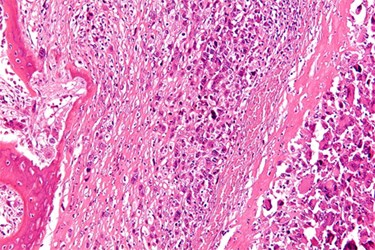New Nanoparticles Simultaneously Kill Cancer And Strengthen Bones
By Joel Lindsey

A collaborative research team made up of scientists from the Dana-Farber Cancer Institute and Brigham and Women’s Hospital (BWH) has devised a new method for helping to prevent and treat bone cancer that uses nanoparticles to deliver drugs directly to cancer cells in the bone.
“Bone is a favorable microenvironment for the growth of cancer cells that migrate from tumors in distant organs of the body, such as breast, prostate, and blood, during disease progression,” Archana Swami, a researcher in BWH’s Laboratory of Nanomedicine and Biomaterials and co-leader of the new study, said in a press release issued recently. “We engineered and tested a bone-targeted nanoparticle system to selectively target the bone microenvironment and release a therapeutic drug in a spatiotemporally controlled manner, leading to bone microenvironment remodeling and prevention of disease progression.”
To create the new nanoparticle, researchers combined biodegradable polymers with alendronate, a bisphosphonate therapeutic agent that has been proven to readily bind to calcium, one of the primary substances found in human bones.
By covering the surface of the nanoparticle with alendronate, scientists were able to produce a particle that naturally identified and attached to bone tissue. Once attached, the nanoparticles were then able to deliver doses of drugs to simultaneously help kill tumor cells and stimulate healthy bone tissue growth, according to the press release.
“There are limited treatment options for bone cancers,” said Michaela Reagan, researcher at Dana-Farber’s Center for Hematologic Oncology and another co-leader of the study. “Our engineered targeted therapies manipulate the tumor cells in the bone and the surrounding microenvironment to effectively prevent cancer from spreading in bone with minimal off-target effects.”
In early tests, researchers used the new nanoparticles to treat mice with a type of bone cancer called multiple myeloma. They found that the treatment resulted in slower myeloma growth and prolonged survival. Additionally, researchers found that when bortezomib was used as a pre-treatment application, overall bone strength, growth, and volume were enhanced.
“These findings suggest that bone-targeted nanoparticle anti-cancer therapies offer a novel way to deliver a concentrated amount of drug in a controlled and target-specific manner to prevent tumor progression in multiple myeloma,” said Omid Farokhzad, director of the BWH Laboratory of Nanomedicine and Biomaterials and a co-senior author of the study. “This approach may prove useful in treatment of incidence of bone metastasis, common in 60 to 80 percent of cancer patients and for treatment of early stages of multiple myeloma.”
Details and results from the research team’s experiments have been published recently in Proceedings of the National Academy of Sciences.
